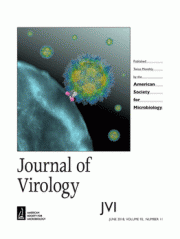Posted on January 15, 2016
Source: Journal of Virology

Keun Young Hwang and Young Bong Choi
Mitochondrial lipid raft-like microdomains, experimentally also termed mitochondrial detergent-resistant membrane fractions (mDRM), play a role as platforms for recruiting signaling molecules involved in antiviral responses such as apoptosis and innate immunity. Viruses can modulate mitochondrial functions for their own survival and replication. However, viral regulation of the antiviral responses via mDRM remains incompletely understood. Here, we report that human herpesvirus 8 (HHV-8) gene product viral interferon regulatory factor 1 (vIRF-1) is targeted to mDRM during virus replication and negatively regulates the mitochondrial antiviral signaling protein (MAVS)-mediated antiviral responses. The N-terminal region of vIRF-1 interacts directly with membrane lipids, including cardiolipin. In addition, a GxRP motif within the N terminus of vIRF-1, conserved in the mDRM-targeting region of mitochondrial proteins, including PTEN-induced putative kinase 1 (PINK1) and MAVS, was found to be important for vIRF-1 association with mitochondria. Furthermore, MAVS, which has the potential to promote vIRF-1 targeting to mDRM possibly by inducing cardiolipin exposure on the outer membrane of mitochondria, interacts with vIRF-1, which, in turn, inhibits MAVS-mediated antiviral signaling. Consistent with these results, vIRF-1 targeting to mDRM contributes to promotion of HHV-8 productive replication and inhibition of associated apoptosis. Combined, our results suggest novel molecular mechanisms for negative-feedback regulation of MAVS by vIRF-1 during virus replication.